

Pariveda Solutions

Texas, United States
January 2024
Computer programming services
Service with Minor Environmental Footprint
Canada,
United States
At Pariveda, a consulting firm dedicated to solving complex business challenges, doing good isn't an afterthought, it’s foundational. They have spent 20 years perfecting the art of balancing purpose and profit to ensure their impact on the world goes beyond the walls of their organization. Pariveda’s intentional design includes democratic corporate governance through holacracy, offering remarkable equity and transparency within the firm; an ESOP financial structure, equitably distributing wealth and long-term prosperity to employees; and their transparent salary policy and unique approach to career advancement, offering a clear, non-biased path to success. With a focus on developing socially responsible leaders, the organization champions a welcoming environment for all identities through employee resource groups that embrace Black, disabled, LGBTQIA+, female, Jewish, and team members of color. Their culture of service and inclusion is fundamental, with every employee engaged in community contributions, supported by a leadership team with over 50% female board members. These company attributes highlight their commitment to working toward change as they pave the way for professional services firms across the globe.
Overall B Impact Score
Governance 19.1
Governance evaluates a company's overall mission, engagement around its social/environmental impact, ethics, and transparency. This section also evaluates the ability of a company to protect their mission and formally consider stakeholders in decision making through their corporate structure (e.g. benefit corporation) or corporate governing documents.
What is this? A company with an Impact Business Model is intentionally designed to create a specific positive outcome for one of its stakeholders - such as workers, community, environment, or customers.
Workers 56.2
Workers evaluates a company’s contributions to its employees’ financial security, health & safety, wellness, career development, and engagement & satisfaction. In addition, this section recognizes business models designed to benefit workers, such as companies that are at least 40% owned by non-executive employees and those that have workforce development programs to support individuals with barriers to employment.
What is this? A company with an Impact Business Model is intentionally designed to create a specific positive outcome for one of its stakeholders - such as workers, community, environment, or customers.
Community 19.8
Community evaluates a company’s engagement with and impact on the communities in which it operates, hires from, and sources from. Topics include diversity, equity & inclusion, economic impact, civic engagement, charitable giving, and supply chain management. In addition, this section recognizes business models that are designed to address specific community-oriented problems, such as poverty alleviation through fair trade sourcing or distribution via microenterprises, producer cooperative models, locally focused economic development, and formal charitable giving commitments.
Environment 5.2
Environment evaluates a company’s overall environmental management practices as well as its impact on the air, climate, water, land, and biodiversity. This includes the direct impact of a company’s operations and, when applicable its supply chain and distribution channels. This section also recognizes companies with environmentally innovative production processes and those that sell products or services that have a positive environmental impact. Some examples might include products and services that create renewable energy, reduce consumption or waste, conserve land or wildlife, provide less toxic alternatives to the market, or educate people about environmental problems.
Customers 2.8
Customers evaluates a company’s stewardship of its customers through the quality of its products and services, ethical marketing, data privacy and security, and feedback channels. In addition, this section recognizes products or services that are designed to address a particular social problem for or through its customers, such as health or educational products, arts & media products, serving underserved customers/clients, and services that improve the social impact of other businesses or organizations.
What is this? A company with an Impact Business Model is intentionally designed to create a specific positive outcome for one of its stakeholders - such as workers, community, environment, or customers.